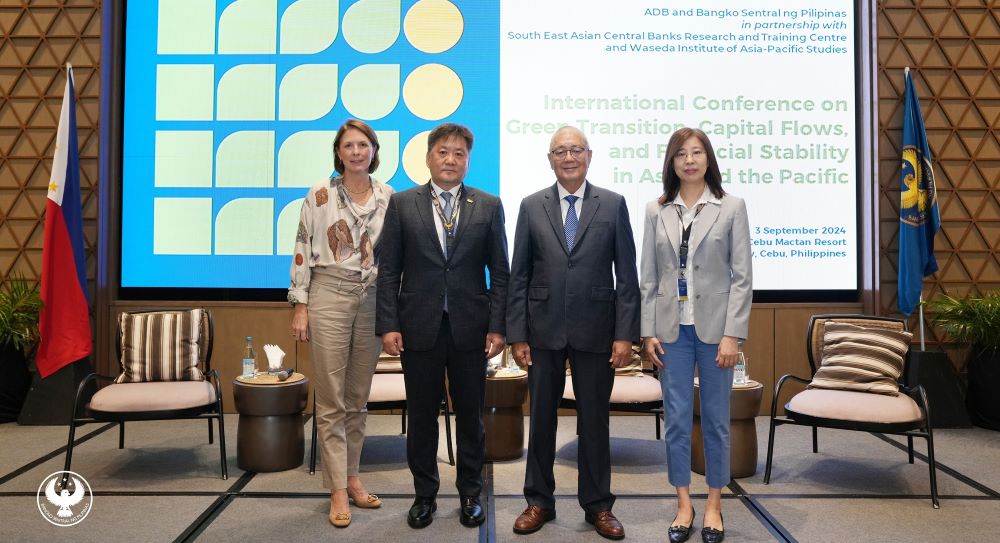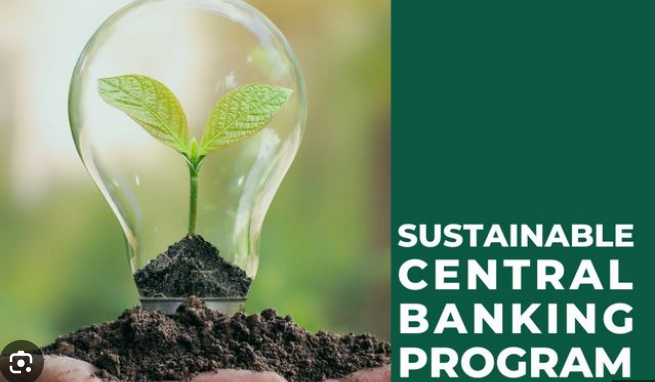Bangko Sentral ng Pilipinas (BSP) Governor Eli M. Remolona, Jr. recently underscored the vital role of central banks in managing critical climate risks during the “International Conference on Green Transition, Capital Flows, and Financial Stability in Asia-Pacific,” held in Mactan, Cebu earlier this month.

Photo shows BSP Governor Eli M. Remolona, Jr. and Bank of Mongolia Governor Byadran Lkhagvasuren (3rd and 2nd from left) together with ADB Advisor Lotte Schou-Zibell (left) and Director Cyn-Young Park
In a media advisory, Governor Remolona stated that central banks have the regulatory tools necessary to mitigate the systemic risks posed by climate change, positioning climate risk as the “ultimate systemic risk” in today’s financial landscape.
BSP’s tools to help address climate risks
Governor Remolona highlighted that climate risks, which have increasingly been recognized as an “implied mandate” for central banks, can be managed using regulatory frameworks traditionally used to address systemic risks in the financial system.
“These tools can be harnessed to push for greater climate adaptation,” he further stated, explaining that mechanisms like designating systemically important banks or adjusting capital requirements for risky sectors can be effectively applied to climate-related financial risks.
This approach places climate risk alongside more traditional financial stability concerns, allowing central banks to implement regulations that encourage both financial institutions and markets to account for environmental sustainability in their operations.

Engaging the financial sector in climate adaptation
To further ensure that the financial sector is equipped to manage climate risks, BSP Assistant Governor Lyn I. Javier shared the institution’s ongoing efforts to clarify its expectations for supervised institutions.
“We continue to engage the financial industry to strengthen their capacity for managing climate risks,” Javier said. She also stressed that building this capacity is crucial, particularly for industries that are less prepared to deal with the complexities of climate change.
Javier further highlighted the importance of collaboration with development partners, including the Asian Development Bank (ADB), in providing technical expertise and capacity-building programs. “This is where development partners, such as the ADB, come in because they can bring in experts that could capacitate the industry,” she added, emphasizing the need for international expertise to support local efforts in building climate resilience.
Unlocking private capital for green projects
BSP Assistant Governor Pia Bernadette Roman Tayag highlighted the crucial need to mobilize private capital to support sustainable projects, particularly in sectors most vulnerable to climate risks, such as small and medium-sized enterprises (SMEs). Tayag emphasized the role of innovative financing mechanisms in providing access to international capital, which would support the funding of climate-resilient projects.
“We need to encourage innovative financing mechanisms that allow projects to access international capital. This goes hand in hand with our efforts to develop our domestic capital market, to provide alternative sources of financing,” Tayag noted.
According to Tayag, this dual approach —unlocking both international and domestic capital — can help accelerate the Philippines’ transition to a greener economy, particularly in vulnerable sectors where access to capital is often a challenge.
Key topics and global expertise at the conference
The conference, organized by BSP in collaboration with ADB, South East Asian Central Banks (SEACEN) Research and Training Centre, and Waseda Institute of Asia-Pacific Studies, brought together a diverse group of experts to discuss how to bolster green investments for developing economies.
The event covered key topics such as pricing climate risks, mobilizing private capital for low-carbon transition initiatives, and developing sustainable finance mechanisms.
Notable speakers included Governor Remolona, Bank of Mongolia Governor Byadran Lkhagvasuren, ADB Director Cyn-Young Park, and ADB Advisor Lotte Schou-Zibell. The conference also featured insights from leaders like Development Academy of the Philippines President and CEO Majah-Leah V. Ravago, World Bank Lead Economist Gonzalo Varela, and Glasgow Financial Alliance for Net Zero Managing Director Yuki Yasui, among others.
These thought leaders provided a wealth of knowledge on how central banks and financial institutions can work together to manage climate risks and support sustainable development, especially in the Asia-Pacific region, which is highly vulnerable to climate impacts.

Moving forward: BSP’s vision for a greener economy
The BSP’s efforts to address climate risks reflect its broader vision of fostering financial stability and resilience in a changing climate. Governor Remolona’s call to action emphasizes the crucial role central banks must play in ensuring that financial systems are not only robust but also environmentally sustainable.
As climate change continues to pose unprecedented challenges, central banks like the BSP are positioned to lead the charge in promoting sustainable finance, encouraging green investments, and fostering a financial system that is resilient to both economic and environmental shocks.
Through conferences like this and collaborative efforts with global institutions, the BSP is taking proactive steps to support the Philippines’ green transition and strengthen financial stability in the face of climate risks.
In 2022, the BSP also launched the third phase of its sustainable finance regulations with the issuance of Circular No. 1149 or “Guidelines on the Integration of Sustainability Principles in Investment Activities of Banks.” The circular’s guidelines were approved last August 23, 2022, with then BSP Governor Felipe M. Medalla saying that the new rules will help address sustainable finance essentials, particularly its safety and soundness.







